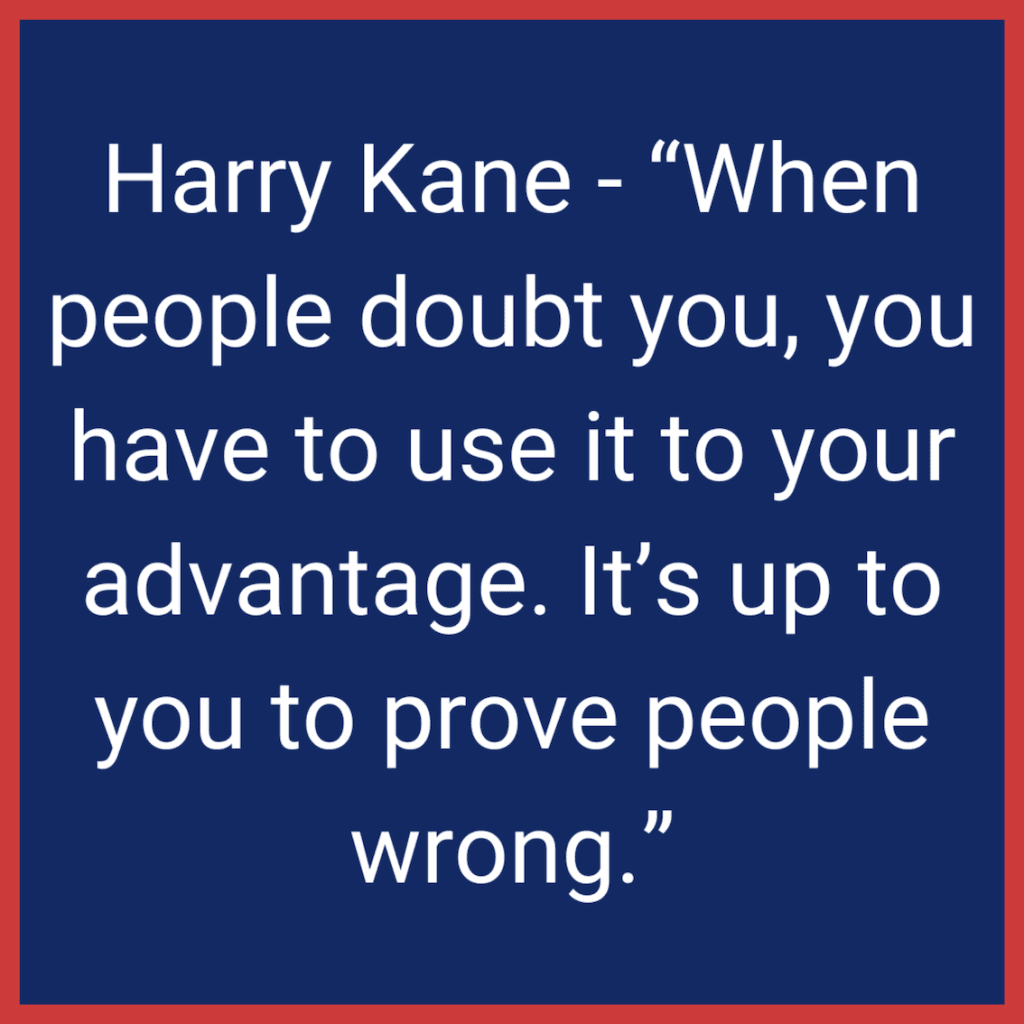29 November 2023

Developing The X-FACTOR To Transform Your Football Performances
How to Play Soccer Expectation Free
If you were to play soccer or football expectation free what would other people see?
From my experience of supporting 1000s of footballers from the 8 year old child up to the Premier League player you’d likely notice many of the following 10 things:
- A soccer player who plays matches at the same level as he or she trains.
- A footballer who doesn’t worry about making mistakes.
- A soccer player who bounces back positively after making perceived errors.
- A footballer who is brave in the way they place their shots.
- A soccer player who is vocal demanding the ball regularly from team-mates even if their team is 3 nil down.
- A footballer who embraces the physical side of the game, who commits to tackles strongly even against taller and stronger opponents.
- A soccer player who shows courage getting on the ball from the first whistle.
- A footballer who spends the bulk of the match on their toes, moving into space to receive the ball.
- A soccer player who is decisive when on the ball.
- A footballer who plays with a smile on their face despite adversities.
This is miles away from the football or soccer player who battles with confidence levels that yo-yo from minute to minute and match to match. That is right, we are talking about the “confidence player” that is often talked about by football pundits and ex-players.
7 Reasons why you don’t want to be that confidence player!
- You will likely wait for things to happen in a game.
- Your coach or manager won’t trust you in key moments or big games.
- You will likely come away from games, thinking “if only.”
- The slightest perceived error in your mind will hit you hard and cause you a lot of frustration, ensuring that you miss out on showing how good you can be in a match because you are stuck dwelling in the past.
- You’ll often feel uncomfortable and talk yourself out of situations.
- When you hear we were playing with 10 players today, you’ll often be that 11th player who went missing for large chunks of matches.
- You’ll likely be jealous of team-mates and other players and spend a lot of time playing the blame game.
How can I help myself?
Step one is to understand yourself better, to identify the expectations that you place on yourself and others that can hinder your performance.
For example, below are some common expectations that I hear from players:
- On training v matches: I expect the coach/gaffer to substitute me if I don’t produce the goods.
- On making errors: It’s always in the back of my mind if I make an error that my team-mates will have a go at me.
- On shooting: I often play it safe and don’t put it right in the corner of the goal, in case, I hit it wide. The goalkeeper then often saves it.
- On being vocal: I need to start a game well and do some good things before asking for the ball.
- On enjoying playing: If I smile, people will think I don’t care.
- On playing against physically intimidating and aggressive players: I worry I’ll get hurt when I tackle big players.
Step two: Is then to consider better expectations that you could set yourself.
For instance, if we look at the examples above these expectations are much more helpful:
- On training v matches: I expect myself to treat each match and training session exactly the same, playing with focus, intensity and giving maximum effort unless told otherwise by my coach/gaffer.
- On making errors: I expect to make some errors, all players do. However, after an error I’ll continue to be brave and play with courage.
- On shooting: I expect to score 2/10 chances as Harry Kane does, so I will just react and trust my ability to find the back of the net when I get chances.
- On being vocal: Being vocal from the first whistle, will mean I get on the ball more and influence the match, helping the team.
- On enjoying playing: I go out to play with a smile, it can wind the opposition up, which is part of my job.
- On playing against physically intimidating and aggressive players: I expect myself to give 100% commitment to duels and tackles regardless of who I come up against.
Step 3: Is then to go on and set yourself some mini goals that replace your expectations as you will hear in episode 206 of the Demystifying Mental Toughness podcast when I talk about your approach to big matches.
WORD OF THE DAY
Expectations
Our expectations are what can help football and soccer players start matches “1 nil up” or “1 nil down.” In other words, expectations can help or hinder your performance. If they are thought out well expectations that are turned into process driven goals and objectives can be hugely helpful when you go out onto the pitch. However, many expectations can turn into lots of pressure, as they are the demands that you place on yourself about the quality of your performance. When you are in “judgement mode” judging the quality and standard of your performances and specific outcomes or results based on past experiences. Many people make it difficult for themselves as their expectations revolve around things that they cannot control.
CHECK US OUT ON INSTAGRAM WHERE YOU’LL FIND IMAGES AND POSTS LIKE THIS

Footballers: What is success to you in your next match?
🏆 Winning perhaps
⚽️ Scoring perhaps
⚽️ Creating an assist perhaps
👍 Playing well perhaps
What’s wrong with this interpretation of success?
😌 Nothing it’s natural BUT there is a big chance that you may have indirectly created a problem for yourself. Pressure, more pressure and extra pressure…
WHY?
🧠 All of these aims are out of your control, you’re reliant on team-mates, opponents, coaches and the referee.
SOLUTIONS
🍔 Imagine this burger is the outcome of key ingredients such as mince, onion, burger relish, cheese, burgers buns etc.. cooked in the oven. In your case – now consider what are the key ingredients that are under your control and ensure that you succeed with your goals for your match? Is it being brave calling for the ball, committing to tackles, tracking runners, being brave taking your player on…
🧠 Now make sure you focus on these key ingredients in every match and every training session and you won’t go too far wrong.
TO DO LIST:
WATCH – Pep Guardiola on managing expectations at Manchester City on Skysports Retro
READ – Managing your Expectations in Soccer Blog with Dan Abrahams
EXPLORE – A great way of mentally preparing yourself ahead of a match is by getting a pen and paper out and writing down what you expect of yourself. Be that in your warm up, at the start of the match, if you make a mistake, if you come up against a quick skilful opponent or a loud intimidating team… It can then help you flush away any unhelpful expectations and fears that you have that may limit your performance.
FACT – Many football and soccer players, even at professional level, often have high, strict and unrealistic expectations of themselves which equals inconsistent performances and frustration.
TIP – Always set yourself one to two process goals or mini-objectives in a training session or match that will help you produce a good performance. For example, rate yourself out of 10 for how brave your were with your communication, demanding the ball and actively encouraging your team-mates.
QUOTE – Harry Kane – “When people doubt you, you have to use it to your advantage. It’s up to you to prove people wrong.”
THOUGHTS – Many football and soccer players struggle to deal with criticism, be that from team-mates, coaches/their gaffer, spectators or keyboard warriors on social media. The players expectations are often unrealistic which can cause potential issues. For instance, if a footballer’s team-mate (player B) made a mistake, player A would encourage him or her. Therefore, this player (player A) may expect to be spoken to in the same way, and goes on to find it very difficult when others criticise them or raise their voice. For some players, they then let these comments impact their confidence hugely, they end up going missing in a game or after a match spend a long time quiet or upset. Whereas others football players like Kane don’t let it bother them and go on to use it as motivation.

SHARE THE X-FACTOR
Share The X-FACTOR with your friends, family and colleagues, and create a positive difference to the lives of more football players, coaches, parents and enthusiasts.

Best Wishes
David Charlton
Online Sports Psychologist | Mental Performance Coach who supports many highly motivated athletes, young and old, developing their skills or who are already highly skilled so that they gain a mental edge and get the most from their talent across the globe from USA/Canada to Great Britain and Ireland to UAE, South Africa, Australia and New Zealand, using ONLINE Video Conferencing.
Managing Director – Inspiring Sporting Excellence
Host of Demystifying Mental Toughness Podcast
Founder of The Sports Psychology Hub
Author of The Mental Edge
With over a decades’ experience supporting athletes, coaches, parents and teams to transfer their skills from training to competitive situations, under pressure.
T: +44 7734 697769







